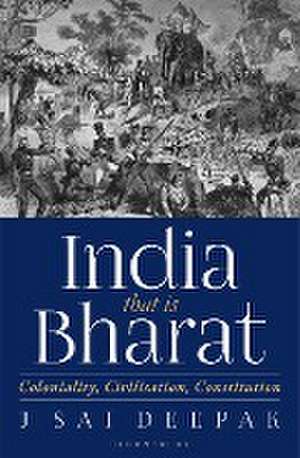India that is Bharat: Coloniality, Civilisation, Constitution
Autor J Sai Deepaken Limba Engleză Hardback – 29 aug 2021
Preț: 159.27 lei
Preț vechi: 205.85 lei
-23% Nou
Puncte Express: 239
Preț estimativ în valută:
30.48€ • 31.78$ • 25.33£
30.48€ • 31.78$ • 25.33£
Disponibilitate incertă
Doresc să fiu notificat când acest titlu va fi disponibil:
Se trimite...
Preluare comenzi: 021 569.72.76
Specificații
ISBN-13: 9789354352508
ISBN-10: 9354352502
Pagini: 484
Dimensiuni: 153 x 234 mm
Greutate: 0.87 kg
Editura: Bloomsbury Publishing
Colecția Bloomsbury India
Locul publicării:New Delhi, India
ISBN-10: 9354352502
Pagini: 484
Dimensiuni: 153 x 234 mm
Greutate: 0.87 kg
Editura: Bloomsbury Publishing
Colecția Bloomsbury India
Locul publicării:New Delhi, India
Caracteristici
Dissects
the
Christian
nature
of
European
colonisation
and
its
influence
on
the
Indian
Constitution's
making
Notă biografică
J.
Sai
Deepakis
an
engineer-turned-litigator,
practising
as
an
arguing
counsel
primarily
before
the
Supreme
Court
of
India
and
the
High
Court
of
Delhi.
A
mechanical
engineer
from
Anna
University,
he
graduated
with
a
bachelor's
degree
in
law
from
IIT
Kharagpur's
Law
School
in
2009,
and
has
carved
a
niche
for
himself
as
a
litigator
in
civil
commercial
and
constitutional
matters.
Over
the
years,
he
has
been
part
of
several
landmark
matters,
such
as
the
ones
relating
to
the
Sabarimala
Ayyappa
Temple,
the
Sri
Padmanabhaswamy
Temple
and
Basmati
Geographical
Indications.
In
2019,
he
was
awarded
the
Young
Alumni
Achiever's
Award
by
his
alma
mater
IIT
Kharagpur.
Apart
from
delivering
lectures
on
constitutional
issues,
he
is
a
prolific
writer
for
leading
newspapers
and
magazines.
Recenzii
Sai
Deepak
builds
a
strong
decolonial
argument
disengaging
from
modern
Western
orthodoxy
of
the
either/or,
and
proposes
instead
the
decolonial
logic
of
neither/nor.
He
does
it
by
means
of
a
detailed
and
careful
reconstitution
of
knowledges,
ways
of
knowing
and
patterns
of
sensing
that
were
destituted
and
continue
to
be
so
in
the
name
of
progress,
democracy
and
economic
development,
all
under
the
mantra
that
more
is
better.
J. Sai Deepak has begun something here that needs serious attention. It also suggests that significant support is required to develop its proposals further in directions not yet explored. I hope the book will be read and debated widely, especially in and for the sake of the 'India that is Bharat'.
Through this magisterial trilogy, advocate and scholar J. Sai Deepak successfully fills a huge vacuum in the corpus of decolonial scholarship from a uniquely empathetic Indian perspective. In a masterful manner, Sai Deepak traces the global history of colonialism, India's unfortunate tryst with it and, importantly, inquires its impact on the emergence of a colonial consciousness. A must-read tribute to the Indic civilisation for anyone serious about understanding the pernicious trajectory of invasive colonialism and the lingering colonial consciousness in the 'independent' Indian (or should we term this as he does, Bharateeya) mind, and how to consciously work towards reversing it.
Advocate J. Sai Deepak has provided India with a milestone: a step from superficial to integral decolonization. Few combine the vision of a civilisational liberation, easy to invoke in malleable cultural respects, with the exacting juridical knowledge needed for a precise and workable paradigm shift deconstructing this lingering submission.
The wealth of evidence the author marshals in support of his arguments is truly impressive and reflects the rigour of his study. I have no doubt thatIndia that is Bharatwill be a welcome addition to the nascent corpus of literature in this specialist field. That it has emerged from India is a bonus.I wish the book and its author all the success in getting the recognition it deserves.
The book is a must-read for everyone who is interested in understanding the relationship between the consciousness of the world's oldest surviving indigenous civilisation and the Constitution of the world's largest democracy.
J. Sai Deepak has begun something here that needs serious attention. It also suggests that significant support is required to develop its proposals further in directions not yet explored. I hope the book will be read and debated widely, especially in and for the sake of the 'India that is Bharat'.
Through this magisterial trilogy, advocate and scholar J. Sai Deepak successfully fills a huge vacuum in the corpus of decolonial scholarship from a uniquely empathetic Indian perspective. In a masterful manner, Sai Deepak traces the global history of colonialism, India's unfortunate tryst with it and, importantly, inquires its impact on the emergence of a colonial consciousness. A must-read tribute to the Indic civilisation for anyone serious about understanding the pernicious trajectory of invasive colonialism and the lingering colonial consciousness in the 'independent' Indian (or should we term this as he does, Bharateeya) mind, and how to consciously work towards reversing it.
Advocate J. Sai Deepak has provided India with a milestone: a step from superficial to integral decolonization. Few combine the vision of a civilisational liberation, easy to invoke in malleable cultural respects, with the exacting juridical knowledge needed for a precise and workable paradigm shift deconstructing this lingering submission.
The wealth of evidence the author marshals in support of his arguments is truly impressive and reflects the rigour of his study. I have no doubt thatIndia that is Bharatwill be a welcome addition to the nascent corpus of literature in this specialist field. That it has emerged from India is a bonus.I wish the book and its author all the success in getting the recognition it deserves.
The book is a must-read for everyone who is interested in understanding the relationship between the consciousness of the world's oldest surviving indigenous civilisation and the Constitution of the world's largest democracy.
